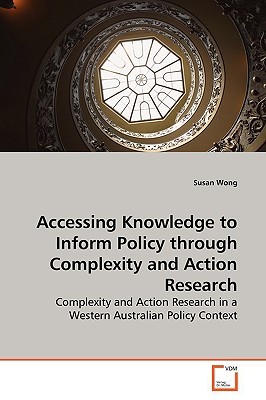
- We will send in 10–14 business days.
- Author: Susan Wong
- Publisher: VDM Verlag
- ISBN-10: 3639032233
- ISBN-13: 9783639032239
- Format: 15.2 x 22.9 x 1.9 cm, minkšti viršeliai
- Language: English
- SAVE -10% with code: EXTRA
Accessing Knowledge to Inform Policy through Complexity and Action Research (e-book) (used book) | bookbook.eu
Reviews
Description
How do governments use knowledge to inform policy-making and policy-implementation? What are the epistemological aspects and assumptions made within the parameters of the classical scientific paradigm that filter the use of knowledge? This study argues that knowledge formed within this paradigm, usually generated at a distance, has been individuated, detached, segmented and abstracted. When used to inform policy, such knowledge creates a narrow ?standardising gaze? that ?disciplines? communities to conform to dominant social behaviour and beliefs. Case studies are used to demonstrate that the two major models of development, as products of this paradigm, employ this gaze rendering replicability difficult if not impossible. These models are the top-down and bottom-up approach that are epitomised by the Silicon Valley model and telecentre movement respectively. How this gaze inhibits/facilitates development in policy implementation in regional development is then examined in the Goldfields Esperance region in Western Australia. An holistic approach using complex adaptive systems and action research is used to understand the multidisciplinary aspects involved in development.
EXTRA 10 % discount with code: EXTRA
The promotion ends in 23d.19:13:35
The discount code is valid when purchasing from 10 €. Discounts do not stack.
- Author: Susan Wong
- Publisher: VDM Verlag
- ISBN-10: 3639032233
- ISBN-13: 9783639032239
- Format: 15.2 x 22.9 x 1.9 cm, minkšti viršeliai
- Language: English English
How do governments use knowledge to inform policy-making and policy-implementation? What are the epistemological aspects and assumptions made within the parameters of the classical scientific paradigm that filter the use of knowledge? This study argues that knowledge formed within this paradigm, usually generated at a distance, has been individuated, detached, segmented and abstracted. When used to inform policy, such knowledge creates a narrow ?standardising gaze? that ?disciplines? communities to conform to dominant social behaviour and beliefs. Case studies are used to demonstrate that the two major models of development, as products of this paradigm, employ this gaze rendering replicability difficult if not impossible. These models are the top-down and bottom-up approach that are epitomised by the Silicon Valley model and telecentre movement respectively. How this gaze inhibits/facilitates development in policy implementation in regional development is then examined in the Goldfields Esperance region in Western Australia. An holistic approach using complex adaptive systems and action research is used to understand the multidisciplinary aspects involved in development.


Reviews